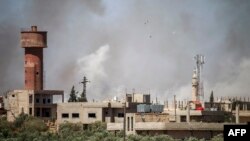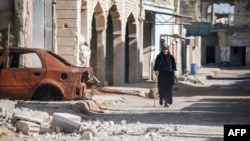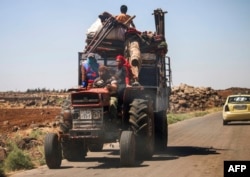Syrian government forces kept up their pressure on the country's strategic southwest Friday, using artillery and airstrikes and dropping barrel bombs that targeted rebel-held parts of the region, activists said.
The Britain-based Syrian Observatory for Human Rights said more than 12 barrel bombs hit the province of Daraa, in the first use of the rudimentary and non-discriminatory weapons there in over a year when a truce went into effect in the area. Rockets and artillery shells have also targeted northern and eastern Daraa, and there were reports of overnight airstrikes on Busr al-Harir, a northeast Daraa town where government troops are trying to isolate the rebels.
The government campaign in the southwestern Syrian region bordering Jordan and the Israeli-occupied Golan Heights comes despite U.S. warnings of "serious repercussions" for anyone violating a de-escalation agreement in place since last July. The de-escalation zone was negotiated by Russia, the Syrian government's main ally, Washington and Jordan.
Rebel factions, meanwhile, said they responded with missiles at a government air base in the adjacent Sweida province.
The Observatory said 16 people have been killed in government strikes since Tuesday, including nine children. At least 12,000 people have been displaced by fighting in the area since, according to the war monitor.
The agreement has been unraveling in recent weeks as the Syrian government turned its attention southward, after seizing opposition-held areas near the capital, Damascus. Israel, meanwhile, has become more active in opposing Iran's expansion in Syria, carrying out airstrikes against suspected Iranian targets in the area.
Iran is a major backer of President Bashar al-Assad, and its military advisers and allied militias such as Lebanon's Hezbollah, have been fighting alongside his troops.
U.S. State Department spokeswoman Heather Nauert said on Thursday that Washington was "deeply troubled" by the Syrian government operations in the area and called on Moscow to "restrain" its ally from further actions that risk broadening the conflict.
Southwestern Syria is a mix of government and rebel-controlled areas, with rebels controlling parts of Daraa city and areas along the border with Jordan and the occupied Golan Heights.
Russia and the Syrian government have been pressing for an agreement with the rebels in the area to restore government authority, including over the commercial crossing with Jordan that has been out of its control for years. Talks over extending the de-escalation zone have faltered, although Assad said last week that Moscow, the U.S. and Israel continued discussing a settlement in the area.
Israel wants Iranian-backed militias out of the border area. Jordan wants to avoid a humanitarian crisis at its borders with the renewed violence and is eager to see the border crossing with Syria reopened. The U.N. estimates that 750,000 Syrians live in the region, which has been spared the devastation that hit other parts of Syria in the last three years.
The Russian Ambassador to Lebanon, Alexander Zasypkin, told the Lebanese al-Akhbar daily that Israel fears the presence of Hezbollah and Iran in the south.
"We say that the Syrian army, with support from the Russian troops, is regaining control of its territories and restoring the state authority there," Zasypkin said. "There is no justification for Israel to carry out any action that would hamper fighting terrorism."
U.S. airstrike
Meanwhile, highlighting the tension in the southern area, skirmishes late Thursday between a U.S.-backed rebel group and pro-government forces miles away were followed by a U.S. airstrike that left a Syrian soldier killed, Syrian media and a U.S. official said.
The U.S maintains a base in Tanf, miles east of Daraa province where the government has been striking rebel positions.
A U.S. official said that during a patrol by the U.S.-backed fighters inside a de-confliction zone around the base, a small number of pro-government forces fired at them from outside of the zone. U.S. and aligned forces retreated, but the pro-government forces continued to fire, the official said.
A U.S. airstrike was later called in, in "self-defense," said the official who wasn't authorized to discuss the situation publicly and insisted on anonymity. The airstrike in the al-Halba area killed one soldier, the Syrian state news agency SANA reported.
The U.S. official said the airstrike was near the de-confliction zone around the base, where the U.S. trains Syrian fighters, and which was agreed to in a deal between the U.S. and Russia. The Syrian government and its Iranian allies want the U.S. to evacuate the base.






